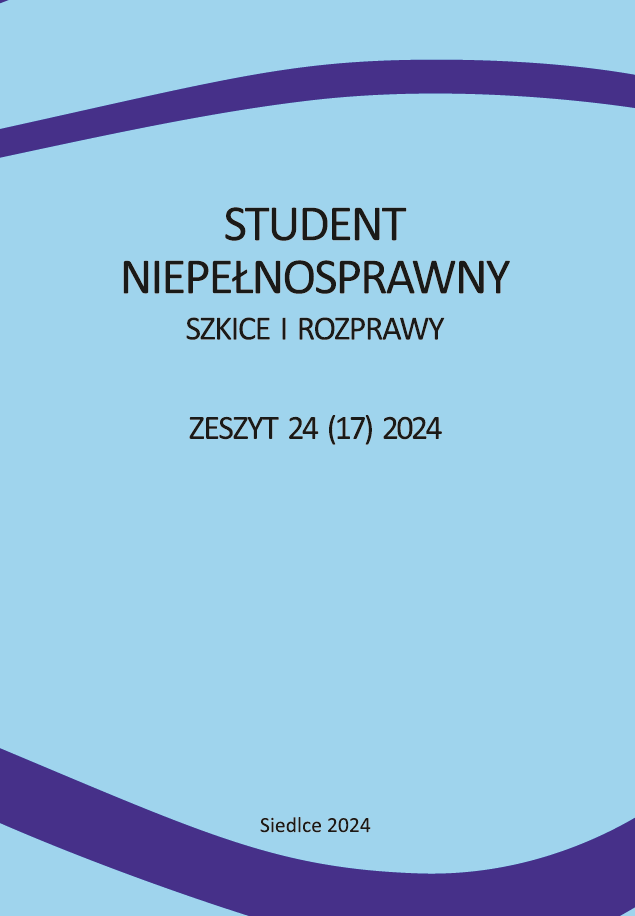The functioning of a person with an intellectual disability according to the opinions of students of the University of Siedlce
DOI:
https://doi.org/10.34739/sn.2024.24.09Keywords:
social attitudes, stereotypes, intellectual disabilityAbstract
The effect of shaping the ethics and culture of modern man is his attitude towards individuals who are different from him and his tolerance for non-uniformity. In connection with the above topic, research on the functioning of people with disabilities requires constant amendment and supplementation. The aim of the research was to learn students' views on the functioning of people with intellectual disabilities. The research was in the form of a diagnostic survey, carried out using an own questionnaire. The research was con-ducted among one hundred students from such fields as: pedagogy, other social sciences, medical sciences, exact and natural sciences, and humanities. The work consists of three main chapters. The first one shows the functions and types of social attitudes and characterizes the concept of social attitudes and stereotypes. The second one presents a description of the own research methodology. The third one presents the results of own research on how a person functions with intellectual disabilities. To get rid of all social barriers, inclusive education must continue to be promoted from an early age. This would eliminate all stereotypes, physical and mental barriers of society towards people with intellectual disabilities.
Downloads
References
Ceranek-Dadas A., Neumann-Schmidtke E. (2005), Encyklopedia pedagogiczna XXI wieku, t. 4, Warszawa.
Dykcik W. (2001), Pedagogika specjalna, Poznań, UAM.
Fałdowska M.A. Świderski, G. Wierzbicki (2016), Kultura bezpieczeństwa. Potrzeby
i uwarunkowania, t. III, Siedlce.
Gazdulska M. (2008), Postawy społeczeństwa wobec osób z niepełnosprawnościami w ujęciu historycznym i współczesnym. Seminare, „Poszukiwania Naukowe”, nr 25.
Kirenko J., Łaba-Hornecka A. (2018), Niepełnosprawność intelektualna – wyuczona bezradność. Uwarunkowania, Wydawnictwo Uniwersytetu Rzeszowskiego.
„Kwartalnik Niepełnosprawność i Rehabilitacja” (2022), nr 2.
Łobocki M. (2009), Metody i techniki badań pedagogicznych, Wydawnictwo Impuls, Kraków.
Student Niepełnosprawny. Szkice i Rozprawy
Macrae C.N., Stangor Ch., Hewstone M. (1999), Stereotypy i uprzedzenia. Najnowsze ujęcie, Gdańskie Wydawnictwo Psychologiczne, Gdańsk.
Maszke A.W. (2003), Metodologiczne podstawy badań pedagogiki, Rzeszów.
Myers D.G. (2003), Psychologia społeczna, Poznań.
Pospiszyl I. (2008), Patologie społeczne, Wydawnictwo Naukowe PWN, Warszawa.
Skalska K. (2015), Wsparcie społeczne a satysfakcja z życia studentów z niepełno-sprawnością, „Student Niepełnosprawny. Szkice i rozprawy”, nr 15(8).
Wyczesany J. (1999), Pedagogika upośledzonych umysłowo, Kraków.
Zacharuk T. (2015), Kształcenie studentów niepełnosprawnych w Uniwersytecie Przyrodniczo- Humanistycznym w Siedlcach, „Student Niepełnosprawny. Szkice i rozprawy”, nr 15(8).
Żuraw H. (2014), Studenci niepełnosprawni doby ponowoczesności w Polsce, „Student Niepełnosprawny. Szkice i rozprawy”, nr 14(7).
Downloads
Published
Issue
Section
License
Copyright (c) 2024 Disabled Student. Sketches and Theses

This work is licensed under a Creative Commons Attribution-NonCommercial 4.0 International License.




